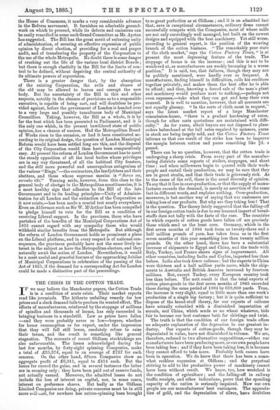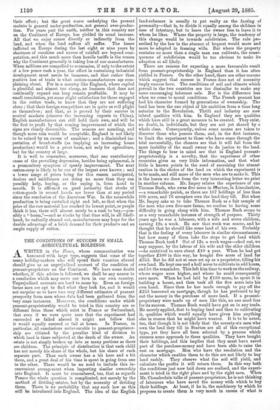THE CRISIS IN THE COTTON TRADE.
IF we may believe the Manchester papers, the Cotton Trade is in a condition of acute crisis. Their market reports read like jeremiads. The hitherto unfailing remedy for low prices and a slack demand fails to produce its wonted effect. The efforts of manufacturers, reinforced by the stoppage of millions of spindles and thousands of looms, has only succeeded in bringing business to a standstill. Low as prices have fallen —and they were probably never so low—buyers, whether for home consumption or for export, under the impression that they will fall still lower, resolutely refuse to raise their terms, and the result is something like general stagnation. The accounts of recent Oldham atocktakings are also unfavourable. The losses acknowledged during the last few months, by forty-eight spinning Companies, make a total of £35,374, equal to an average of £737 for each concern. On the other hand, fifteen Companies show an aggregate profit of £6,311, equal to £414 each. But the losses far exceed the gains, and in several instances the latter are in seeming only ; they have been paid out of reserve funds, not actually earned. Moreover, the admitted losses do not include the loss of interest on capital, nor, in some cases, interest on preference shares. But badly as the Oldham Limited Companies are doing, private concerns must be in still more e. tee, for nowhere has cotton-spinning been brought
to so great perfection as at Oldham ; and it is an admitted fact that, save in exceptional circumstances, ordinary firms cannot successfully compete with the Companies, most of whose mills are not only exceedingly well managed, but built on the newest designs and equipped with the best machinery. Yet still worse, according to general report, is the position of the weaving branch of the cotton business. " The remarkably poor state of the cloth market," says the Cotton Factory Times," is at present the most depressing feature of the trade. The stoppage of looms is on the increase ; and this is not to be wondered at, as manufacturers are weekly becoming in a worse position." It is said, too, that failures, though they may not be publicly mentioned, were hardly ever so frequent. A manufacturer, finding himself in difficulties, calls his creditors together privately, and makes them the best offer he is able to afford ; and they, knowing a forced sale of the man's plant and machinery would produce next to nothing,—perhaps not even expenses,—take what they can get and keep their own counsel. It is well to mention, however, that all accounts are not equally gloomy. " In the sorts of cloth most in request," says the latest market report of a large Manchester commission-house, "there is a gradual hardening of rates, though for other sorts quotations are maintained with diffi- culty." As for yarns, albeit buyers are not disposed to place orders beforehand at the full rates required by spinners, yarns in stock are being largely sold, and the Cotton Factory Times informs us that one result of the strike has been to improve the margin between cotton and yarns something like id. a pound. There can be no question, however, that the cotton trade is undergoing a sharp crisis. From every part of the manufac- turing districts come reports of strikes, stoppages, and short time ; and when millowners begin to quarrel with their work- people and curtail their production, we may be sure that they are in great straits, and that their trade is grievously sick. As to the cause of the evil, there is the usual diversity of opinion. To say that it lies in over-production, or that the supply of manu- factures exceeds the demand, is merely an assertion of the same fact in different words, and explains nothing. Over-production, moreover, is but another way of saying that our customers are taking less of our products. But why are they taking less ? That is the question. The theory lately suggested that the falling-off in our foreign cotton trade is due to our lessened import of bread- stuffs does not tally with the facts of the case. The countries to which exports of cotton goods have fallen off are precisely those which send us the least corn. Germany, which in the first seven months of 1884 took from us twenty-three and a half million pounds of yarn, has taken from us in the first seven months of this year something less than twenty million pounds. On the other hand, there has been a substantial increase of shipments to Egypt and China, and the trade with Italy, Turkey, and France shows signs of improvement. All other countries, including India and Ceylon, imported less than before. India also took fewer calicoes ; but the exports to China were thirteen and a half million yards more, while the ship- ments to Australia and British America increased by fourteen millions. But, except Tarkey, every European country took less than before. The nett result is that the total exports of cotton piece-goods in the first seven months of 1885 exceeded those during the same period of 1884 by 639,800 yards. True, the increase is very slight, equal to little more than one week's production of a single big factory ; but it is quite sufficient to dispose of the bread-stuff theory, for our exports of calicoes have actually coincided with a diminished importation of cereals, and China, which sends us no wheat whatever, bids fair to become our best customer both for shirtings and twist.
The truth is that the condition of our foreign trade offers no adequate explanation of the depression in our greatest in- dustry. Our exports of cotton-goods, though they may be depreciated in value, have not diminished in volume. We are, therefore, reduced to two alternative suppositions,—either our manufacturers have been producing more, or our own people have been taking less ; and if they have been taking less, it is because they cannot afford to take more. Probably both causes have been in operation. We do know that there has been a some- what reckless expansion at Oldham ; and the perpetual striving to add to the productive power of machinery cannot have been without result. We know, too, how wretched is the condition of agriculture ; and the falling-off in railway traffic receipts, and other indications, prove that the spending capacity of the nation is seriously impaired. Now our own people are our manufacturers' beet customers. The apprecia- tion of gold, and the depreciation of silver, have doubtless their effect ; but the great cause underlying the present malaise is general under-production, not general over-produc- tion. For years past the earth, neither in this country nor on the Continent of Europe, has yielded its usual increase. All that we enjoy comes directly or indirectly from the land, and when the land suffers all suffer. The losses -inflicted on Europe during the last eight or nine years by shortness of sunshine and excess of rainfall are beyond com- putation, and this much more than hostile tariffs is the reason why the Continent generally is taking less of our manufactures. When millions are compelled to economise, if only to the extent of a few pence each a year, the effect in restraining industrial development must needs be immense, and that rather than positive loss of trade is what cotton-manufacturers ate com- plaining about. For in a country like England, where capital is plentiful and almost too cheap, no business that does not continually expand can long remain profitable. It may be small consolation, yet some slight satisfaction for those engaged in the cotton trade, to know that they are not suffering alone ; that their foreign competitors are in quite as evil plight as themselves ; and that, as is proved by their success in neutral markets (observe the increasing exports to China), English manufacturers can still hold their own, and will be the first to profit by that coming improvement of which the signs are clearly discernible. The seasons are mending, and though more rain would be acceptable, England is not likely to be ruined by an excess of sunshine ; and a diminished im- portation of bread-stuffs (as implying an increasing home production) would be a great boon, not only for agriculture, but for the country at large.
It is well to remember, moreover, that one contributory cause of the prevailing depression, besides being ephemeral, is a premonitory symptom of speedy improvement. The next cotton-crop is likely to be one of the largest ever known ; and a lower range of prices being for this reason anticipated, dealers and middlemen are doing no more than they can possibly help, buying, as the saying is, from hand to month. It is affirmed on good authority that stocks of cotton-goods in second hands are lower than at any period since the conclusion of the American War. In the meanwhile production is being curtailed right and left, so that when the price of the raw material has reached its lowest point, or people think it has, there will almost surely be a rush to buy,—pos- sibly a " boom,"—and as stocks by that time will, in all likeli- hood, be radically cleared out, manufacturers may hope for the double advantage of a brisk demand for their products and an ample supply of cotton.



































 Previous page
Previous page